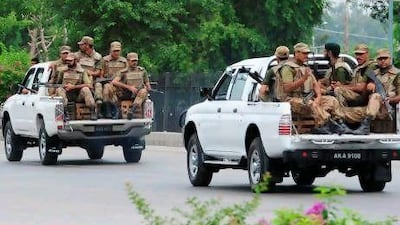KARACHI // The assault yesterday by Islamist militants on a Pakistani air force base raised fears about the security of the country's military and nuclear installations as well as the continuing ability of the Pakistani Taliban to launch sophisticated terrorist operations.
While some international media reports tied the base in Kamra, 25 kilometres north-west of Islamabad, to Pakistan's nuclear weapons programme, security analysts in the country downplayed any direct link as a storage site. They did not, however, dismiss outright concerns over nuclear security in Pakistan.
"I've never heard that Kamra is a site for nuclear weapons," said Hasan-Askari Rizvi, a Lahore-based defence analyst. "But I think there is a logical argument that says that if they can penetrate this base then they could penetrate a nuclear installation."
The Pakistan Army denied that any nuclear material is housed at Minhas Air Force base, as the site of the attack is officially named.
At least eight militants with automatic weapons and rocket-propelled grenades - some allegedly in Pakistani military uniforms - scaled walls around the vast perimeter of Minhas about 2am before attacking, according to the Pakistan Air Force. They blew a hole in a hangar's wall with a rocket, and shrapnel from the blast slightly damaged one aircraft, an air force spokesman told the Associated Press.
One of the base's guards was killed when he and others opened fire on the militants. Commandos and security forces fought the militants for two hours before killing all of them, the spokesman said.
The Tehrik-e-Taliban Pakistan (TTP) took responsibility for the operation yesterday afternoon. Ihsan Ihsanullah, a TTP spokesman, said it was aimed at avenging the deaths of Baitullah Mehsud, the former TTP leader who died in 2009 from injuries sustained in a CIA drone attack, and Osama bin Laden, the Al Qaeda leader killed in Pakistan by US special forces last year.
The Minhas attack comes at a time of growing speculation that the Pakistan military was preparing to launch an offensive on the militant stronghold of North Waziristan, home to a number of factions including the Haqqani network, the Afghan group that the United States considers its fiercest enemy in Afghanistan.
The Pakistan military has refused to make a move against the Haqqani network, claiming that it is already overstretched in its battle against the TTP.
The US defence secretary, Leon Panetta, on Tuesday claimed that the Pakistani military's assault on North Waziristan was imminent. But US hopes could be dashed once again in the fallout from the Minhas attack. "We haven't heard anything from Pakistani side on an operation, but if there were those plans, they will be postponed for some time," Mr Askari said.
Some analysts speculated that pressuring the military to put the operation on hold was the immediate aim of the TTP attack. While that may or may not be true, the assault is the latest in a renewed terrorist campaign within Pakistan in recent months in response to Pakistani operations and CIA drone strikes.
"This was a base from which air force operations against the TTP were launched, so they're trying to drive home a point: you hit us and we'll hit you," said Ikram Sehgal, a retired military officer and defence analyst based in Karachi.
In May, competing Pakistani Taliban factions decided to ally, pool resources and go on the offensive after a year in which they sustained serious setbacks, said Muhammad Amir Rana, the director of the Islamabad-based Pakistan Institute for Peace Studies.
Since last October there had been a significant decline in TTP attacks. But over the past three months police and military installations in Punjab have been attacked, and dozens of the TTP's Pushtun political enemies in the Awami National Party (ANP), a secular party that rules the north-west Khyber Pakhtunkhwa province, have been gunned down in Karachi, where the ANP has a foothold.
"This intensification is perhaps the last resort for them after the killing of their key operational leaders to hit back and maintain the perception among the public and the Pakistan military that they have capabilities to launch massive operations," said Mr Rana.
"The quality of their available human resource has declined significantly, and this was reflected in the failure of the attackers to capture anyone or destroy aircraft," said Mr Askari. "But they have achieved their psychological objectives."
Of particular concern is the seeming ease with which major military installations have been breached by terrorists. TTP militants killed officers and took hostages within the army's headquarters in Rawalpindi in 2009, and in May last year, the Mehran naval base in Karachi was attacked by TTP militants who killed 18 servicemen in a nearly 20-hour siege.
This time, there were even warnings. The Karachi-based Express Tribune newspaper in a report on August 10 quoted intelligence officials who said the TTP were planning to attack air force bases before the end of Ramadan.
"It's a major embarrassment for the security forces, and exposes the continuing deficiencies in security systems of military installations," Mr Askari said.

